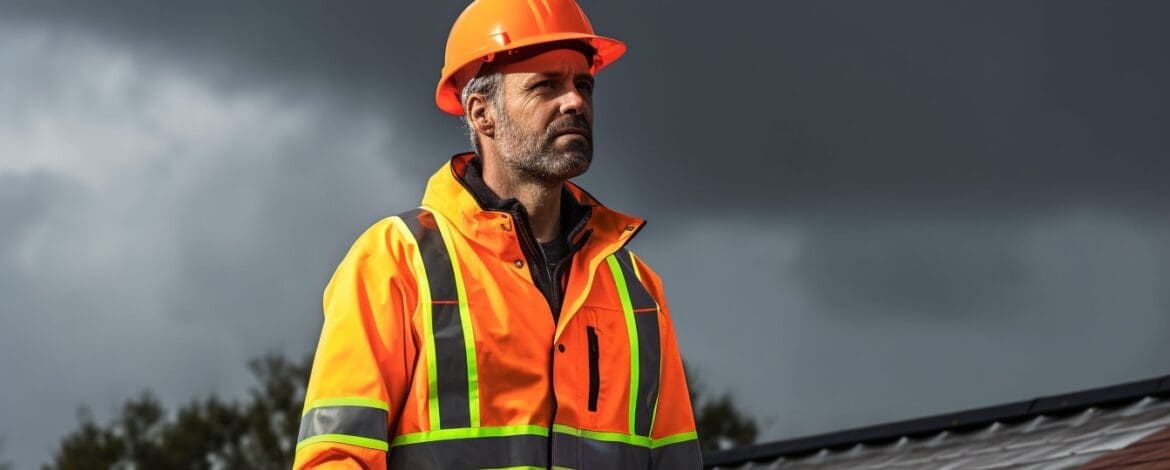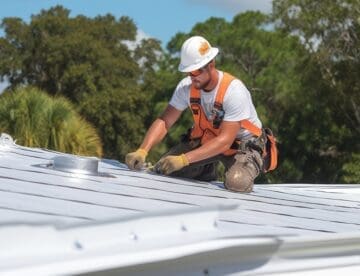When it comes to finding a reliable roofing company in Florida, it can feel like navigating a minefield. It seems that after the storm has passed, the rain has stopped, and the sun is shining again, shady roofing companies appear from nowhere. Unfortunately, horror stories of scams and subpar roof repairs are too common in Florida’s roofing industry.
How can you ensure you don’t fall victim to a shady roofing scammer?
Finding an honest roofer to repair a damaged roof or install a new one is crucial. Many roofing scams involve using shady tactics, cheap materials at inflated costs, and shoddy work. The result is a bad roofing job and and a bad roof that needs frequent repairs and may not last through the next major storm in the Sunshine State.
But with so many options available, separating a good roofing company from a shady one can be tricky.
This article breaks down the red flags to ensure you avoid shady roofers when looking for a roof replacement or repair.
Understand the Common Red Flags
The first step to avoiding a shady roofing contractor is understanding common roofing scams. These involve low-ball bidding, fake credentials, upfront payment scams, and high-pressure sales tactics. The good news is that common red flags are easy to spot if you know how roof scammers operate.
Here are five common red flags to look out for:
- Upfront cash demands: A common roof scam is to ask for a large payment upfront or insist on cash-only terms. Reputable roofing companies usually have multiple payment options and allow you to pay after the job is done.
- Aggressive sales tactics: Be wary of contractors using high-pressure sales tactics, like a “limited-time offer,” or pressuring you into making a quick decision. A reputable roofer will provide all the necessary information and give you time to consider your options.
- Vague contract terms: Always insist on detailed contracts that clearly outline the scope of work, materials to be used, and the estimated project timeline. The contract should have a specific cost for completing the roofing project.
- Lack of physical address: Reputable roofing companies usually have a physical office where you can visit or contact them. Beware of contractors who only provide a mobile phone number or do not have a verifiable address.
- No licensing or insurance: Ensuring the contractor has the required licenses to operate in Florida is necessary. A legitimate Florida roofing company will also have adequate liability insurance to protect you and their workers in case of any accidents or damages during the project.
Remember, avoiding storm chasers and hiring a legitimate roofing contractor ensure a well-constructed roof and a stress-free experience for you as a homeowner.
Do Your Homework
The best way to avoid a shady roofing contractor is to research the company thoroughly. After all, major roof repairs can cost thousands of dollars. And even if an insurance company is paying for the repairs, you still have deductibles to pay.
Here are some steps to avoid falling victim to roofing scams:
- Check reviews and testimonials: Research their online presence before hiring a roofing contractor. Sites like the Better Business Bureau, Google Reviews, and Yelp can provide valuable insights into other customers’ experiences. If there are no reviews, it’s a sign of a shady roofing contractor.
- Ask for references: Reputable contractors should be willing to provide references from past clients. Reach out to these references and ask about their experience with the contractor, the quality of their work, and if they would recommend them.
- Verify licensing: It’s important to ensure that the roofing company you hire is properly licensed. You can check with MyFloridaLicense.com to confirm their credentials and validate their qualifications.
- Ensure they have insurance: A trustworthy roofing company should have liability insurance. This insurance protects you from potential liabilities, such as accidents or damages during the roofing project.
Get Everything in Writing
A written contract outlines project details, costs, timelines, and warranties. These facts and details provide a clear reference point, protecting you from shady behavior, inflated material costs, and insurance fraud. A clear contract protects you against misunderstandings and establishes legal recourse.
Here is a list of the must-haves a legally-binding contract should contain:
- Contractor information
- Your information
- A detailed project description of the roofing work to be performed
- Project timeline, including a start date, estimated completion date, and milestones or deadlines
- A breakdown of all costs should include labor, materials, permits, taxes, and any additional charges or fees
- The payment schedule should specify the deposit amount, progress payments, and the final payment
- Change orders in case the project scope, cost, or timeline changes
- Insurance and warranty information
- Outline who is responsible for obtaining necessary permits and scheduling inspections, if required
- Cleanup schedule
- Dispute resolution
- Cancellation policy
- Termination clause
Other Ways to Avoid Shady and Dishonest Contractors
Here are some other ways to protect yourself from potential scams that bad roofing contractors like to use:
- Avoid “too good to be true” deals: While looking for competitive quotes for roof repairs is understandable, avoid offers that are way below market rates.
- Communicate with the company: Ensure it’s easy to communicate with the roofing company. Also, do you get prompt and comprehensive answers to your questions? Unethical roofers are often elusive or difficult to contact.
- Trust your instincts: If you get a bad feeling about a contractor, then it’s probably best to look elsewhere.
Understand Licensing Laws in Florida
All roofing contractors in Florida must be accredited and have the appropriate licenses. Unfortunately, after major storms, shady roofers try to exploit a person’s vulnerability. Some common weather-related scams involve the following:
- Roof wreckers who deliberately damage roofs while conducting a “free” inspection
- Phony contractors who appear after bad storm events
- Getting homeowners to sign off inflated storm damage claims
Related: How to pick the best roofing contractor near you.
Choose a Trusted Partner for Your Roofing Needs
Code Engineered Systems is a trusted roofing contractor in the West Florida area. We have over 47 years of experience in the residential and commercial roofing sectors. You can check out our testimonials to see how we have built a stellar reputation for quality roof repairs. We are also accredited roofing contractors and can help homeowners settle insurance claims after a natural disaster.
If you’re looking for a reliable and trustworthy roofing contractor in the Tampa Bay area, contact Code Engineered Systems today to discuss your needs. Our team of experienced professionals can accurately assess your roof replacement or repair needs and provide a free quote. Contact us today to get started.




